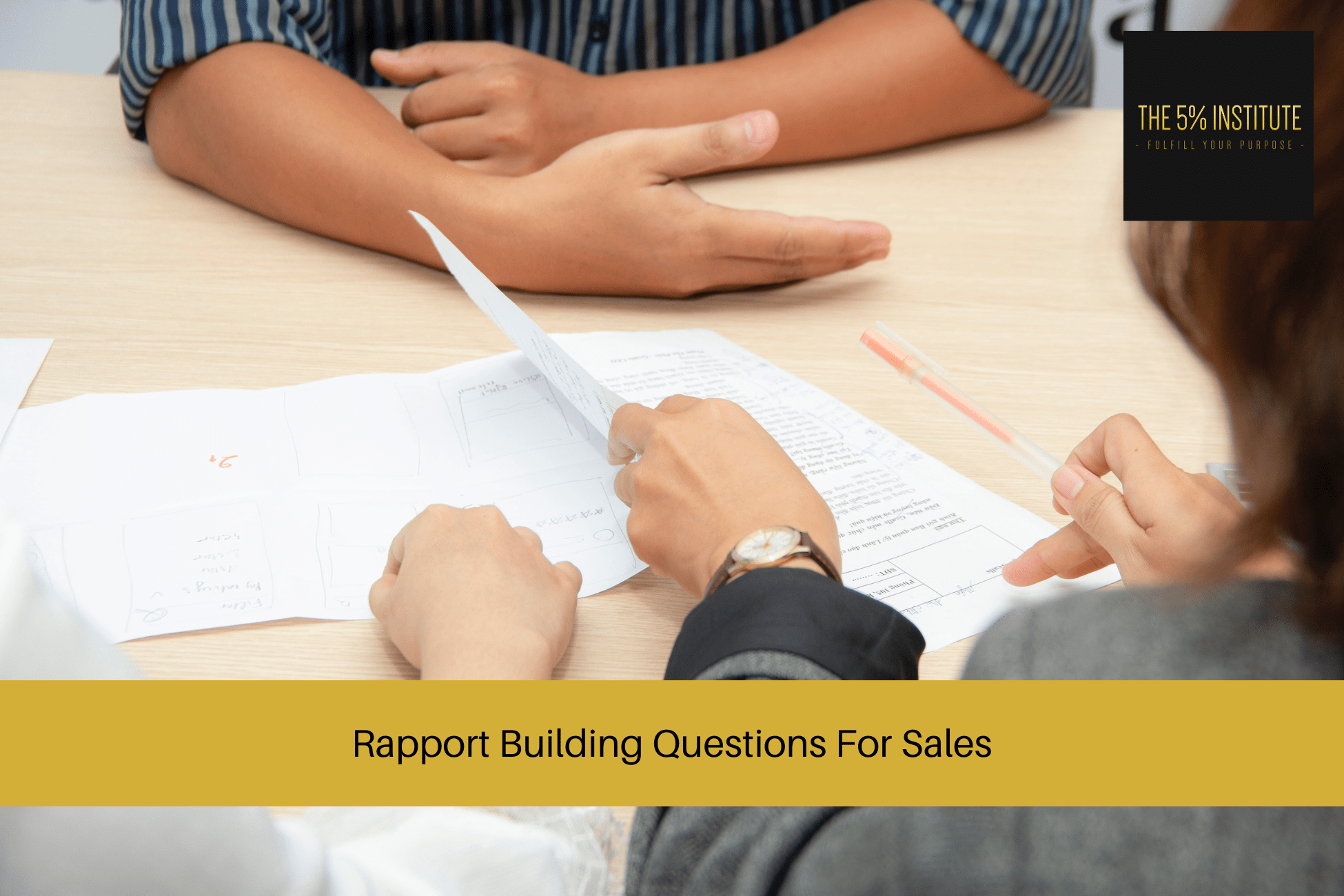
Rapport Building Questions For Sales
In the world of sales, building strong relationships with prospective customers is the key to success. One of the most powerful techniques for achieving this is through the art of asking rapport-building questions.
By engaging prospects in meaningful conversations and showing genuine interest in their needs and desires, sales professionals can establish rapport that goes beyond a mere transactional exchange.
In this article, we will explore the concept of rapport building questions in sales and how they can lead to long-term, fruitful partnerships.
Understanding Rapport Building in Sales
Rapport building is the process of establishing a connection of trust, understanding, and mutual respect with potential customers.
It involves creating an environment where individuals feel comfortable sharing their thoughts, concerns, and aspirations.
When done effectively, rapport building can transform a sales pitch into a conversation, making the prospect more receptive to the salesperson’s message.
Importance of Rapport Building Questions
Building Trust and Credibility
At the heart of successful sales lies trust.
When a prospect trusts a sales professional, they are more likely to believe in the value of the product or service being offered.
Rapport building questions help in developing this trust by showing that the salesperson genuinely cares about the prospect’s needs and is not merely focused on making a sale.
Enhancing Customer Experience
In today’s competitive market, customer experience plays a crucial role in the decision-making process.
When a salesperson uses rapport building questions, they gain valuable insights into the prospect’s preferences and pain points.
This enables them to tailor their offering to match the customer’s exact requirements, thereby creating a positive and memorable experience.
Characteristics of Effective Rapport Building Questions
Open-ended Questions
Open-ended questions encourage prospects to elaborate on their thoughts and feelings rather than providing simple “yes” or “no” answers.
These questions typically begin with words like “how,” “what,” “why,” or “tell me about.”
Personalized Questions
Personalized questions demonstrate that the salesperson has done their homework.
By referencing specific details about the prospect’s business or personal life, the salesperson conveys a genuine interest in forming a meaningful connection.
Empathetic Questions
Empathetic questions show that the salesperson understands and acknowledges the prospect’s challenges or pain points.
They create a sense of empathy and compassion, fostering a deeper connection.
Future-Oriented Questions
Future-oriented questions encourage the prospect to envision how their life or business can be improved with the product or service.
These questions help in highlighting the value proposition effectively.
Examples of Rapport Building Questions
Questions about the Prospect’s Interests and Hobbies
- What do you enjoy doing in your free time?
- Have you pursued any new hobbies lately?
Inquiring about Goals and Challenges
- What are your primary business objectives for the next year?
- What obstacles are preventing you from reaching your goals?
Asking about Personal Experiences
- Can you share a memorable experience related to your industry?
- How did you get started in your current profession?
Questions about the Prospect’s Opinion
- What are your thoughts on the latest industry trends?
- How do you see your industry evolving in the next five years?
Using Rapport Building Questions in Different Sales Stages
At the Beginning of the Sales Process
During the initial interaction, use rapport building questions to establish a comfortable atmosphere and to learn more about the prospect’s needs and challenges.
During Product/Service Presentation
Integrate rapport building questions into your presentation to keep the prospect engaged and to address any concerns they may have.
Overcoming Objections
When facing objections, use empathetic rapport building questions to understand the root cause of the objection and provide personalized solutions.
Closing the Deal
In the final stages, use future-oriented questions to help the prospect visualize the benefits of making a purchase.
Common Mistakes to Avoid
Asking Too Many Questions Rapidly
Rapid-fire questioning can overwhelm the prospect and make them feel like they are being interrogated.
Instead, allow the conversation to flow naturally.
Using Insensitive Questions
Avoid intrusive or personal questions that might make the prospect uncomfortable.
Respect their boundaries.
Failing to Listen Actively
Building rapport is not just about asking questions; it’s about actively listening to the prospect’s responses and engaging in a meaningful conversation.
Tips for Mastering the Art of Rapport Building
Do Your Research
Before engaging with a prospect, research their background, interests, and pain points.
This preparation will demonstrate your sincerity.
Be Genuine and Authentic
Authenticity is key to successful rapport building.
Be yourself, and let your personality shine through in the conversation.
Practice Active Listening
Give your full attention to the prospect’s responses, and ask follow-up questions to show that you value their input.
Adapt to the Prospect’s Communication Style
Everyone communicates differently. Pay attention to the prospect’s style and adjust your approach accordingly.
Rapport Building Questions – Conclusion
In conclusion, mastering the art of rapport building questions is an invaluable skill for any sales professional.
By using these questions effectively, you can create connections that go beyond the transactional level, leading to long-lasting, fruitful relationships with your prospects.
Remember, it’s not just about what you ask; it’s about how you listen and engage with your prospects.
Rapport Building Questions FAQs
Q: Can I use rapport building questions in email or text communication?
A: Absolutely! Rapport building questions can be used in any form of communication to foster meaningful connections with prospects.
Q: What if a prospect seems reluctant to answer my questions?
A: If a prospect appears hesitant, take a step back, and try to build rapport through casual conversation before diving into deeper questions.
Q: How long does it take to build rapport with a prospect?
A: The time required to build rapport varies from person to person.
It could take a single meeting or several interactions, depending on the individual and the circumstances.
Q: Can I use rapport building questions in B2B sales?
A: Yes, rapport building questions are equally effective in B2B sales. They help establish trust and credibility in professional relationships.
Q: Is it possible to overuse rapport building questions?
A: Yes, moderation is key. While rapport building questions are essential, excessive use can lead to a lengthy and unproductive conversation. Use them strategically.
Want To Close Sales Easier?
Are you committed to closing sales a lot easier, and consistently?
If so, you should check out our self-paced and affordable online sales training program; The 5% Sales Blueprint.
It’ll give you everything you need to close sales consistently.
To learn more, simply click on the link below for more information.
Our Online Sales Training Program – The 5% Sales Blueprint.



